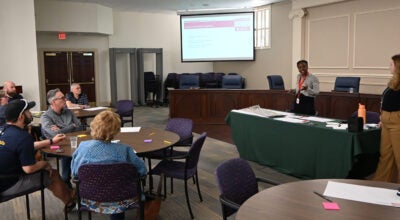Rowan-Salisbury Schools expecting raises, back pay following governor’s signature on state budget
Published 12:09 am Sunday, November 21, 2021
SALISBURY — The more than $1.5 billion state budget signed by Gov. Roy Cooper on Wednesday will mean new money in the pockets of Rowan-Salisbury School employees.
The budget includes back pay to meet new minimum wage standards and salary increases for staff back to the beginning of this fiscal year. The school employee minimum wage will be raised to $13 this fiscal year and to $15 in the 2022-2023 fiscal year, which starts in July. The increases come with additional funding because the district is already working through implementing raises for those staff members.
RSS Chief Financial Officer Carol Herndon said the back pay will impact every employee. Besides the minimum wage increases, Herndon said educators will receive a pay raise as a result of the state budget. She said the retroactive pay will be processed as a bonus to be paid in January. The bonus will apply to people employed as of Jan. 1.
She said the district is awaiting more guidance from the state Department of Public Instruction on back pay and noted concerns about the tax implications for employees.
Specific provisions in the budget are a 5% raise for teachers spaced over two years, a 2.5% raise for principals, new money for cybersecurity, millions for grant programs to benefit after school and summer school programs and $100 million to supplement teacher recruitment in poor counties.
State Superintendent Catherine Truitt issued a statement saying the budget addresses priorities for which she’s advocated.
“I appreciate the General Assembly’s efforts to craft a budget that puts us on a path towards much needed stability and allows for us to continue investing in our students, our education leaders, and our school districts,” Truitt said in a statement on Tuesday “I look forward to Governor Cooper signing this into law and appreciate his recognition of how this budget supports students, small businesses and taxpayers across North Carolina.”
Herndon said RSS doesn’t know exactly how much new funding it will receive as a result of the budget.
“That’s what DPI is working on now,” Herndon said. “Reacting to the now-signed budget and figuring out what that means for extra allotments.”
Herndon said state education officials will create new salary scales to figure out how much new funding goes to each school district. Herndon said the increases should allow the district to move faster on classified staff pay increases than recently expected. Last week, the RSS Board of Education approved pay raises for bus drivers, but there are still classified staff waiting for similar bumps.
Herndon said DPI has been asked to create a grid by position to help districts understand all the considerations for the budget: salary increases, bonuses, amounts, pay dates and other considerations.
Herndon expects to have more specifics early this week.
“I know that they are working more to get more guidance out to us,” Herndon said.
Herndon said the district got to work immediately on amending its budget for federal COVID-19 relief money to pay $2,000 bonuses to all staff the district Board of Education approved on Monday.
“We have already started processing that in payroll to get ahead of the game a bit,” Herndon said, adding she is confident the amendment will be approved.
Herndon will not be with RSS in January when more new budget implementation will be happening. Her last day with the district is Dec. 17; she will be taking over as chief financial officer for Cabarrus County Schools.
“It’s been a journey and one I’ve proud to be involved in,” Herndon said, noting Human Resources Director Jill Hall Freeman has the same passion about completing the work she does.






